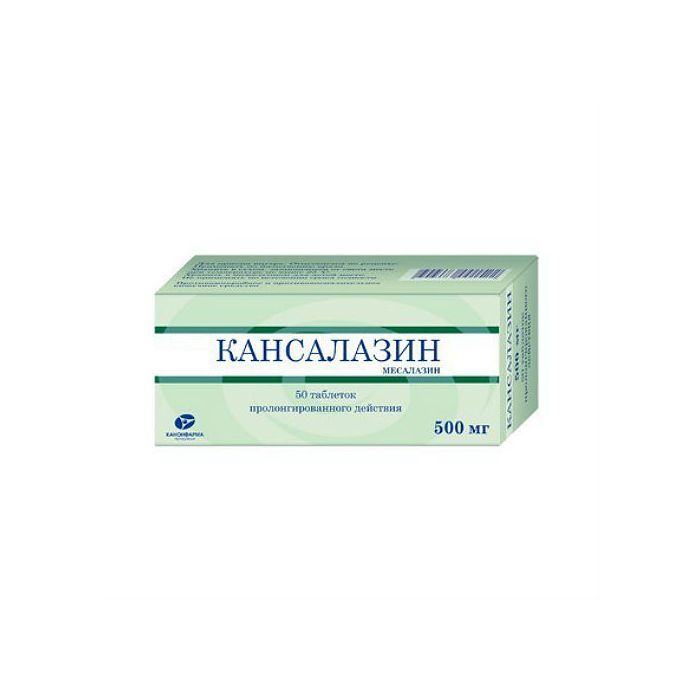mesalazane | Canansalazine Prolong tablets. action 500 mg 50 pcs.
Special Price
$40.18
Regular Price
$48.00
In stock
SKU
BID543199
packaging 50 pcs
Indications
Nonspecific ulcerative colitis, Crohn's disease (prevention and treatment of exacerbations).
Contraindications
Hypersensitivity, blood disease. peptic ulcer of the stomach and duodenum, hemorrhagic diathesis, severe renal / liver failure, lactation, the last 2–4 weeks of pregnancy, children's age (up to 12 years), as well as children weighing less than 50 kg.
Precautions: pregnancy (I trimester), liver and / or renal failure, glucose-6-phosphate dehydrogenase deficiency.
Use during pregnancy and lactation
It is known that mesalazine crosses the placental barrier, however, the limited experience with the drug in pregnant women does not allow us to assess possible side effects. Use in pregnant women is possible only if the intended benefit to the mother outweighs the possible risk to the fetus.
Mesalazine is excreted in breast milk in a concentration lower than in the blood of a woman, while the metabolite - acetyl-mesalazine - is found in a similar or higher concentration. If necessary, the use of the drug during lactation should decide on the termination of breastfeeding.
Composition of
1 tablet contains:
Active ingredient:
mesalazine 500 mg
Excipients:
calcium hydrogen phosphate dihydrate,
silicon dioxide colloidal (Aerosil A-300), srdlcd 6-fold or 6 coppers
sodium alginate (Kelton LVCR),
microcrystalline cellulose,
magnesium stearate.
Dosage and Administration
Sustained-release mesalazine tablets are recommended to be taken whole, without chewing, after meals, drinking plenty of fluids.
ulcerative colitis
Stage of exacerbation
Adults: the dose is selected individually, usually up to 4 g of mesalazine per day in several doses.
Children: the dose is selected individually, usually 20-30 mg of mesalazine per 1 kg of patient’s body weight per day in several doses.
Maintenance therapy
Adults: The dose is selected individually, usually 2 g of mesalazine per day in several doses.
Children: the dose is selected individually, usually 20-30 mg of mesalazine per 1 kg of patient’s body weight per day in several doses.
CROWN DISEASE
Stage of exacerbation and maintenance therapy
Adults: the dose is selected individually, usually up to 4 g of mesalazine per day in several doses.
Children: the dose is selected individually, usually 20-30 mg of mesalazine per 1 kg of body weight per day in several doses.
Side effects of the digestive system: nausea, vomiting, heartburn, diarrhea, decreased appetite, abdominal pain, increased activity of hepatic transaminases, hepatitis, pancreatitis.
From the cardiovascular system: palpitations, tachycardia, increase or decrease in blood pressure, chest pain, shortness of breath.
From the nervous system: headache, tinnitus, dizziness, polyneuropathy, tremor, depression.
Urinary system: proteinuria. hematuria, oliguria. anuria, crystalluria, nephrotic syndrome.
Allergic reactions: skin rash, itching, dermatosis, bronchospasm.
From the hemopoietic organs: anemia (hemolytic, megaloblastic. aplastic), leukopenia, agranulocytosis, thrombocytopenia, hypoprothrombinemia.
Other: weakness, mumps, photosensitivity, lupus-like syndrome, oligospermia, alopecia, decreased production of lacrimal fluid.
Drug Interaction
Increases the hypoglycemic action of sulfonylureas. glucocorticosteroid ulcergenicity. toxicity of methotrexate.
Reduces the activity of furosemide, spironolactone, sulfonamides, rifampicin.
Increases the effect of anticoagulants. Increases the effectiveness of uricosuric drugs (tubular secretion blockers). Slows cyanocobal amine absorption.
Overdose
Symptoms: mild to moderate - symptoms of "salicylicism" (nausea, vomiting, tinnitus, impaired vision, dizziness, severe headache, general malaise, fever - poor prognosis). Severe - hyperventilation of the lungs of central genesis, respiratory alkalosis, metabolic acidosis, confused consciousness, drowsiness, collapse, cramps, anuria, bleeding. Initially, central hyperventilation of the lungs leads to respiratory alkalosis - shortness of breath, asphyxiation, cyanosis, cold sticky sweat with increased intoxication increases respiratory paralysis and the separation of oxidative phosphorylation. causing respiratory acidosis.
In chronic overdose, plasma concentrations are poorly correlated with the severity of intoxication. The greatest risk of developing chronic intoxication is observed in elderly persons with intake for several days more than 100 mg / kg / day. In children and elderly patients, the initial signs of salicylicism are not always noticeable, so it is advisable to periodically determine the concentration of salicylates in the blood: a level above 70 mg% indicates moderate or severe poisoning above 100 mg% - extremely severe. prognostically unfavorable. At moderate poisoning hospitalization for 24 h is necessary.
Treatment: provocation of vomiting, appointment of activated charcoal and laxatives, constant control over the acid-base composition of blood (CBS) and electrolyte balance depending on the state of metabolism - sodium hydrocarbonate sodium solution, solution of sodium carbonate or sodium lactate. Increasing the reserve alkalinity increases the excretion of mesalazine by alkaline urination. Urine alkalinity is indicated at salicylate levels above 40 mg% and is provided by / in infusion of hydrocarbon sodium (88 mEq in 1 l of 5% dextrose solution at a rate of 10–15 ml / h / kg) recovery of circulating blood volume (BCC) and induction diuresis is achieved by administering sodium bicarbonate in the same doses and dilution, which is repeated 2-3 times. Caution should be exercised in elderly patients whose intense fluid infusion may lead to pulmonary edema. Acetazolamide is not recommended for alkaline urination (may cause acidemia and enhance the toxic effect of salicylates). Hemodialysis is indicated with salicylate levels greater than 100-130 mg%. in patients with chronic poisoning - 40 mg% and below in the presence of indications (refractory acidosis, progressive deterioration of condition, severe CNS lesion, pulmonary edema and renal failure). In the case of pulmonary edema, artificial lung ventilation (IVL) with oxygen-enriched mixture.
Storage conditions
Dry, a place protected from light at a temperature of no higher than 25 РC.
Shelf suitability
3 Year
Day
messenger mesalazine
Dosage form
Dosage form
tablets prolong.
Canonfarma, Russia
Write Your Own Review

